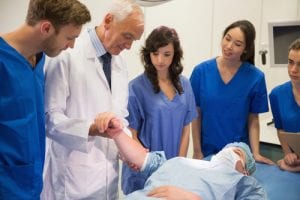The John Radcliffe is a tertiary referral centre and the primary teaching hospital associated with the University of Oxford. Trainees benefit from involvement in the care of patients with advanced pathologies, and are also able to participate in a wide range of exciting research and educational opportunities.

From a more pragmatic day-to-day level, your experience of work here will naturally vary with the job you have applied for. Anaesthetics is an unbanded, four day a week post with extensive opportunities to receive teaching from consultant anaesthetists to gain a solid understanding of the subject. Acute General Medicine has a reputation for putting F1s through the washer – a very intense, very busy post which is primarily service based, rather than teaching based. Due to its size the John Radcliffe plays host to smaller specialties which can lead to unique FY experiences and if you’re already set on what you want to do, you can likely get a post in that specialty here. There are F1 placements in dermatology, plastics, and clinical oncology amongst others.
Currently I am on paediatric surgery which in itself is a rather niche specialty, but thus far has been excellent – we have a well staffed team with excellent nurses and other ward staff. As you might expect with paediatrics, a lot of decisions are senior led and you always feel as though there is someone available to take queries if you’re unsure as a junior. We’re timetabled plenty of theatre time to get stuck in, and also get to experience clinics and on calls. Having said that the hours are long – we start at 07:45, we’re rostered for two sets of seven consecutive nights during the placement, we have ~1 in 4 weekends on, and two weeks of ‘long days’ which last until 8pm. Much of this is not unique to the John Radcliffe and is more a general insight into FY1 life.
The hospital is a tertiary referral centre, some of the best doctors in their field work here, and as a result it is a hotbed for talks, courses and research opportunities both at the hospital itself and in the city. As I’m taking an interest in surgery I was able to attend a day long symposium where I got to learn a raft of surgical skills and operative techniques with high tech equipment all for a token £10 – these sort of events will not be taking place in a rural DGH. I also take an interest in medical technology, and Oxford’s medical innovation hub ‘The Hill’ is based here. Currently we’re involved in the development of an app to assist with clinical care – this is all well received by the faculty who are keen to support such innovations.
Since it’s a teaching hospital it is strongly allied to Oxford medical school, and it is likely as a junior you will be allocated to a medical student and have the opportunity to do some teaching for them. Alternatively this can be taken up more formally with positions at the university if you’re so inclined. Equally for teaching centred around foundation doctors, there’s a Foundation Educational Leads group at the hospital which junior doctors operate and its role is essentially one of making sure doctors are receiving an appropriate amount of training in their post, as well as to implement new ideas or projects that could improve the curriculum for foundation doctors.
In summary, the John Radcliffe will not leave you wanting if you would like to get involved in extracurricular activities related to Medicine. With that said, being an F1 is tough enough on its own, and taking down time is vital (having finished finals there’s also no more guilt of ‘I ought to revise this evening’). Oxford, though one of England’s smaller cities, offers many options to fill your downtime – I’ve already ticked off bouldering, ice skating, swing dancing and have taken up regular squash. The size of the city means it’s easy to get around by bike and you can easily work on forming strong friendships with your colleagues – an important aspect not to overlook when starting life as a doctor.
Words: Peter Woodward-Court
